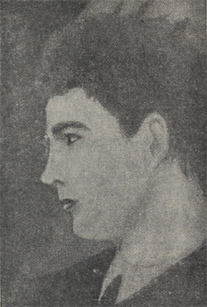
Soon Zoya left for the sanatorium. It was not very far away—at Sokolniki, and on my first free day I went to see her.
"Mama!" exclaimed Zoya dashing up to me, and almost before she had time to say hello. "Do you know who's resting here?"
"Yes?"
"Gaidar! The writer Gaidar! Here he comes."
A tall, broad-shouldered man with a frank pleasant face, which was very boyish somehow, was coming out of the park.
'"Arkadi Petrovich!" Zoya called to him. "Here is my mama, come and meet her." I shook his big strong hand and met his merry laughing eyes; and it immediately seemed to me that I had imagined the author of The Blue Cup and Tirnur and His Squad to be just such a man.
"A very long time ago, when the children and I were reading your first books, Zoya was always asking what you were like, where you lived and could she see you," I said.
"Nothing much to see, is there? I live in Moscow, rest at Sokolniki, and she can see me all day long!" laughingly declared Gaidar.
 |
| Shura in 1939, a self-portrait |
Then someone called him, he smiled at us and went away.
"Do you know how we got to know each other?" said Zoya leading me somewhere along a snowy pathway. "I was walking about in the park, and suddenly I looked and saw a great big man making a snowman. I didn't recognize him at first. What struck me was that he seemed to be in real earnest, really carried away by it, you know, like a small boy. He would step back to admire it…I plucked up all my courage, went right up and said, 'I know you, you're Gaidar, the writer. I know all your books.' And he answered, 'I know you too, and I know all your books: Kiselev's Algebra, Sokolov's Physics and Rybkin's Trigonometry!' "
I laughed: Kiselev, Sokolov and Rybkin were the authors of Zoya's schoolbooks. Then Zoya said, "Let's walk on a bit, I'll show you what he's built: it's a whole fortress."
And indeed, it was like a fortress: in the depths of the park stood seven snow figures in a line. The first one was a real giant, the others got smaller and smaller, and the smallest of all was a snowman sitting behind a stall made of snow, and before him lay pine cones and birds' feathers.
"It's an enemy fortress," Zoya explained, laughing, "and Arkadi Petrovich bombards it with snowballs and we all help him. You can't keep away, it's such fun. You know, Mama," concluded Zoya rather unexpectedly, "I always thought that a man who writes such good books must be very good himself. And now I know that for a fact."
Arkadi Petrovich and Zoya became close friends. They went skating and skiing together, sang songs in the evening and talked about the books they had read. Zoya recited her favourite poems to him, and when we met again he told me, "Your girl reads Goethe wonderfully."
"And do you know what he said to me when he had heard me read Goethe?" exclaimed Zoya in some surprise. "He said, 'Come down to earth, down to earth!' Now what did he mean by that?"
Another time, not long before she left the sanatorium, Zoya told me, "You know, Mama, yesterday I said, 'Arkadi Petrovich, what is happiness? Please don't answer me as you answered Chuck and Geck in your book, by saying that each understands happiness in his own way. There is one big, common happiness for everyone, isn't there?' He got thoughtful and then said, 'There is, of course, such happiness. It's something real people live and die for. But it may take some time before it is established throughout the world.' Then I said, 'Oh, if it would only come!' And he said, 'It certainly will!'
Some days later I came to fetch Zoya home. Gaidar saw us off to the gate. He shook hands to say good-bye and handed Zoya a book.
"It's by me. As a souvenir."
On its cover two boys were fighting: one thin, in a blue suit, the other chubby, in a grey one. They were Chuck and Geck. Overjoyed and confused, Zoya thanked him, and we passed through the gate. Gaidar waved his hand and stood looking alter us. When we looked round for the last time, we saw him strolling unhurriedly along the path towards the house.
Suddenly Zoya stopped, "Mama, perhaps he's written something to me!"
And hesitating, as if she could not make up her mind, she opened the book. On the title page were written in large clear letters the words we knew so well:
"What is happiness?—each understood that in his own way. But together people knew that they must live honestly, work a lot and love and cherish dearly this huge, happy land which is called the Land of Soviets."
"His answer to my question," said Zoya quietly. A few days after her return from the sanatorium, Zoya went to school. She would not hear of staying for a second year.
Next: Classmates
